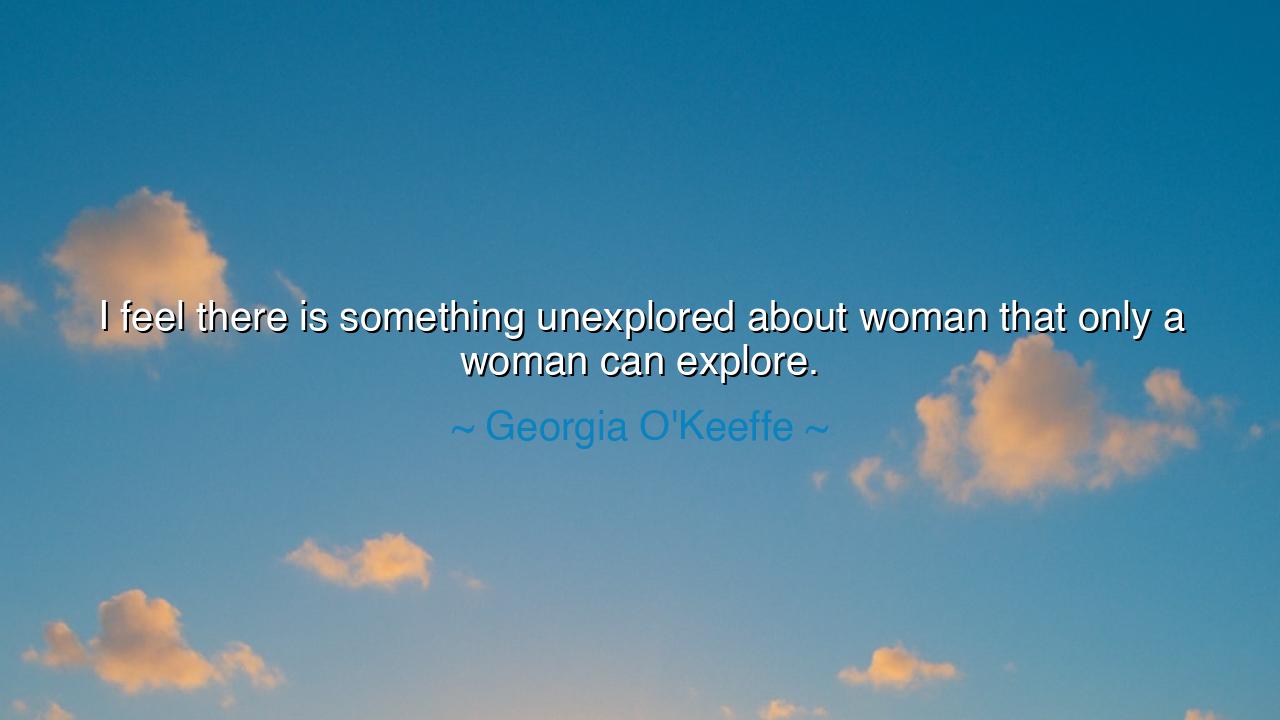
I feel there is something unexplored about woman that only a






The words of Georgia O’Keeffe—“I feel there is something unexplored about woman that only a woman can explore”—resound with the power of revelation. They are not the complaint of one silenced, but the proclamation of one who knew that the feminine soul carries depths yet unseen, landscapes hidden within that men, however skilled or curious, cannot chart. O’Keeffe’s declaration is both personal and universal: that the mystery of woman must be unveiled not by others speaking on her behalf, but by woman herself, daring to enter and give voice to her own sacred truths.
The origin of this wisdom lies in centuries of silence. For generations, men wrote the histories, composed the philosophies, painted the canvases, and defined the meaning of womanhood. Women were often the subject, the muse, the figure to be gazed upon—but rarely the explorer of their own inner world. O’Keeffe, with her brush and her vision, rejected this order. She insisted that only the one who lives in the body, who bears the soul of woman, can tell what it means to be her. To step into that role was not only bold—it was revolutionary.
Consider the life of Mary Wollstonecraft, who in the eighteenth century wrote A Vindication of the Rights of Woman. She declared that women were not created merely to please, nor to reflect man’s glory, but to think, to act, and to reason for themselves. In her age, her words were condemned as scandalous. Yet she dared to say what O’Keeffe later affirmed: that only women could truly explore their own capacity, and that to let men define them was to remain forever chained to a false image.
Or look to the poet Sappho of ancient Greece, whose verses spoke of the passions and longings of women in her own voice, unmediated by the gaze of men. Though much of her work was lost or silenced, the fragments that remain blaze with authenticity, reminding us that whenever women speak for themselves, they reveal dimensions that no outsider could capture. Sappho, like O’Keeffe, proclaimed through her art that the unexplored regions of the feminine soul must be uncovered from within.
The meaning of O’Keeffe’s words is not exclusion, but authenticity. A man may admire, a man may honor, but he cannot fully know what it means to carry the weight and wonder of being woman. The task of exploration belongs to women themselves—to artists, poets, mothers, thinkers, dreamers—each adding a thread to the vast tapestry of feminine experience. The world is impoverished when women are silenced, but it is enriched beyond measure when they rise to tell their truths.
The lesson for us is luminous: do not wait for others to define you. If you are a woman, know that your voice carries truths that only you can reveal. If you are not, honor the voices of women, and do not seek to speak in their place. The journey of exploration is sacred and must be entrusted to those who walk the path themselves. Every time a woman paints, writes, builds, leads, or teaches from her own perspective, she reclaims a piece of the unexplored and offers it to the world.
Practical wisdom calls us to act. Encourage women to create, to study, to lead, and to speak with authority about their own lives. Listen more than you explain. Teach the young that the mystery of womanhood is not something for men to unravel, but for women to embody and to articulate. And if you are a woman yourself, do not silence the stirrings within you. Pick up your brush, your pen, your voice, and add your vision to the world’s storehouse of wisdom.
Thus, let Georgia O’Keeffe’s words endure as a call across the ages: the unexplored depths of woman are vast, and only she herself can explore them. When she does, the world is transformed, for in her revelation lies not only her truth, but the liberation of all humanity. For when women know themselves, they rise heavenward—not as shadows, but as creators of light.






PTPhuong Thuy
O'Keeffe seems to be celebrating the mystery and complexity of womanhood, encouraging women to explore what’s often unspoken or unacknowledged. But is there danger in isolating this exploration to only women? Could men also explore these dimensions through empathy and mutual understanding, or is the exploration of womanhood inherently a personal journey that requires a female perspective?
NQNhu Quynh
It’s intriguing how O'Keeffe implies that only women can truly explore certain facets of themselves. Does this reflect a sense of isolation or self-reliance? How do women, through their lived experiences, find ways to uncover parts of their identity that might not be understood or validated by the outside world?
AKAnh Khong
O'Keeffe’s quote about unexplored territory in womanhood strikes a thought-provoking tone. Could it be that society has neglected or misunderstood women’s experiences in a way that limits the exploration of this 'unexplored' space? How can women, collectively, reclaim this exploration and challenge the boundaries placed on them by social constructs?
NLngo thi nhu lai
There’s something deeply empowering in O'Keeffe’s words—this idea that women have a unique journey of self-exploration. But what does it mean for women to explore this part of themselves? Is this an invitation to go deeper into understanding one's identity, or is it a reflection of how society often compartmentalizes gender roles and expectations?
ATAnh Thu
O'Keeffe suggests that womanhood holds an unexplored dimension, something that only women can truly uncover. This makes me wonder: does this mean that women, by virtue of their experiences, are better equipped to understand aspects of themselves that others may not? Or could this be a call for all people, regardless of gender, to explore and appreciate the hidden aspects of themselves?